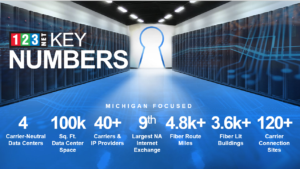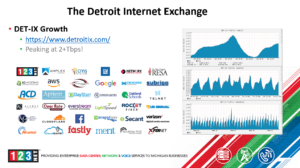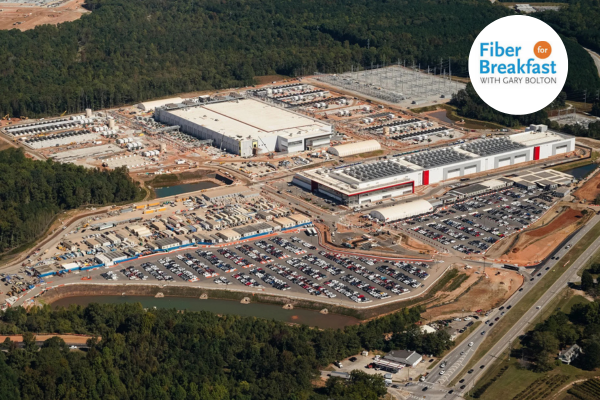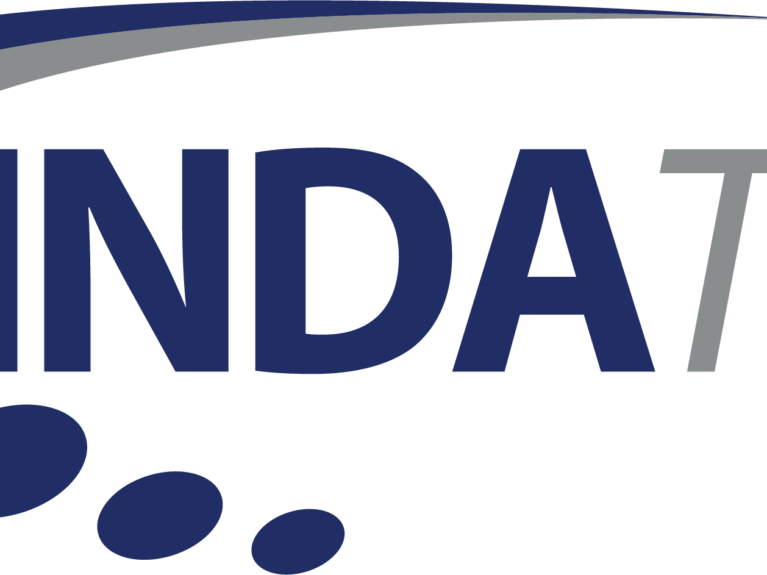Fiber Builds Value: Turning Connectivity into Revenue Along Michigan’s 1-75 Corridor
Fiber Builds Value: Turning Connectivity into Revenue Along Michigan’s 1-75 Corridor
In February 2025, Michigan reached a major broadband milestone with the completion of a 130-mile fiber route from Southfield to Bay City, led by 123NET. This critical infrastructure runs through key communities along the I-75 corridor—including Pontiac, Fenton, Flint, and Saginaw—boosting access, improving reliability, and unlocking new business opportunities. In this week’s Fiber for Breakfast episode, Chuck Irvin, Chief Revenue Officer (CRO) for 123NET talks with Gary Bolton, FBA’s President and CEO and shares how the Michigan-based internet infrastructure provider is transforming connectivity across the state through a mix of cutting-edge technology, carrier-neutral principles, and strategic public-private partnerships.

A Michigan-First Fiber Strategy
With over 150 in-house team members designing, engineering, permitting, and building, 123NET is deploying fiber infrastructure at an impressive rate—nearly 100 miles per month. Over the last 18 months, they’ve added more than 20,000 residential fiber passings and expect to double that by the end of the year.
“We’ve been disciplined in staying focused exclusively on Michigan,” Irvin noted. “That regional focus gives us a deep level of expertise and long-term partnerships that allow us to deliver high-impact outcomes.”
123NET has built one of the largest privately owned fiber networks in the state, providing service to enterprises, carriers, municipalities, and more recently, residential customers. The company also offers fixed wireless and enterprise voice services, although fiber remains its core product—accounting for roughly 60% of total revenue.
Data Centers and Carrier-Neutral Infrastructure
In addition to fiber, 123NET operates four carrier-neutral data centers designed to support enterprise, AI, and interconnection workloads. Its flagship, DC1, is recognized as Michigan’s best-connected building.
This carrier-neutral philosophy extends to 123NET’s long-haul network infrastructure. “We’re taking the carrier-neutral data center model and exploding it onto the long-haul fiber network,” Irvin said. “This enables competition and fosters connectivity in underserved areas.”
In partnership with Peninsula Fiber Network, a recent long-haul build was completed with approximately 130-miles of fiber running from Southfield to Bay City bringing affordable high-speed fiber internet along the previously underserved I-75 corridor.
Public-Private Partnerships in Action
123NET is playing a pivotal role in Michigan’s broadband expansion through strategic partnerships. A key example is the NTIA Middle Mile Grant, a collaboration with Peninsula Fiber Networks to deploy 500 miles of open-access middle-mile fiber, including unprecedented lake crossings connecting Chicago to Michigan and linking the state’s Upper and Lower Peninsulas.
“We’re excited about the impact this project will have—especially in places like Beaver Island, which previously had no fiber access at all,” Irvin said.
The company is also a major recipient of Michigan’s ROBIN (Realizing Opportunity with Broadband Infrastructure Networks) grant. In Allegan County, a $60 million project is underway to build 1,200 miles of fiber serving 11,000 underserved residents. In neighboring areas, similar projects are progressing rapidly, with over 50% of target households already connected.
“These grants allow us to build smarter, faster, and further into communities that need it most,” Irvin emphasized. “They’re the perfect example of what’s possible when the public and private sectors align.”
The Detroit Internet Exchange: Local Traffic, Global Performance
In 2014, 123NET founded the Detroit Internet Exchange (DET-iX), a nonprofit, carrier-neutral peering point. DET-iX is now the ninth-largest Internet exchange in North America by traffic volume and boasts members like Facebook, Google, Microsoft, and most recently, Disney.
This platform helps keep Michigan internet traffic local, reducing costs and latency while improving performance for everyone—from enterprises to everyday users.
DET-iX is free to join and open to any organization with an Autonomous System Number (ASN), including school networks and small ISPs.

Supporting Local Providers and the Broader Ecosystem
123NET’s vertically integrated approach and “Equal Opportunity Network” philosophy are central to its business model. The company offers IRUs, rack space, and transport options that enable small regional providers to scale affordably, lower their cost basis and increase profitability.
Chuck stated, “We’re not trying to serve every home in Michigan ourselves, instead, we want to be the platform that helps others succeed—whether that’s through our fiber, data centers, or the Detroit Internet Exchange.”
With a strong foundation in commercial services, a growing residential footprint, and a track record of successful partnerships, 123NET is helping redefine what it means to be “connected” in Michigan.
Click here to listen to the full episode or find previous episodes of Fiber for Breakfast.
Click here to view the slides presented during today’s episode.




